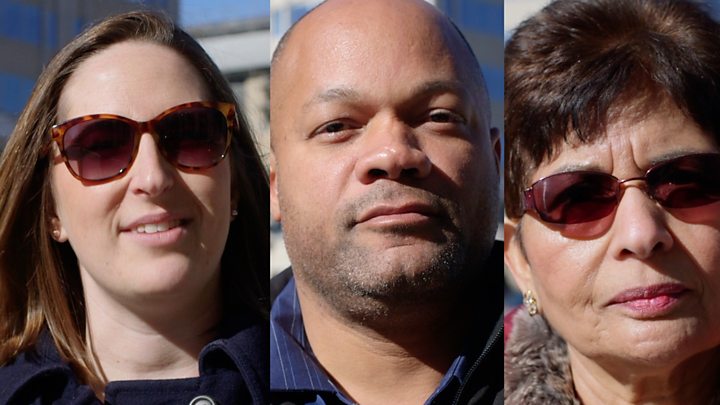US shutdown: Government services closed as working week begins

Hundreds of thousands of federal workers will be unable to report for work on Monday, as the US Senate struggles to end a government shutdown.
The shutdown began at midnight on Friday, when lawmakers failed to agree on an extension to federal funding.
Efforts to reach a compromise ahead of the working week failed late on Sunday.
A vote to end the shutdown was postponed until midday (17:00 GMT) on Monday, meaning many federal government offices will remain closed.
The Senate held a rare session throughout the weekend, in an attempt to reach an agreement ahead of the working week.
But there was little sign of compromise, as Democratic and Republican senators blamed each other.
Democrats want President Trump to negotiate over immigration as part of a budget deal, but Republicans say no agreement is possible while federal government services are closed.
Republicans want funding for border security – including a proposed border wall with Mexico – and immigration reforms, as well as increased military spending.
The session was adjourned at about 21:30 on Sunday (Monday 02:30 GMT). A vote, initially scheduled for early on Monday, was postponed until the afternoon.
The failure to agree on a deal means many federal employees will be "furloughed" – on unpaid leave – until the stalemate is resolved.
On Saturday, Mr Trump said the "nuclear option" of a simple majority vote was necessary to end the impasse.
Skip Twitter post by @realDonaldTrump
Great to see how hard Republicans are fighting for our Military and Safety at the Border. The Dems just want illegal immigrants to pour into our nation unchecked. If stalemate continues, Republicans should go to 51% (Nuclear Option) and vote on real, long term budget, no C.R.’s!
— Donald J. Trump (@realDonaldTrump) January 21, 2018
End of Twitter post by @realDonaldTrump
This is because, under Senate rules, the bill needs 60 votes in the 100-member chamber to overcome blocking tactics by opponents.
The Republicans currently have 51 senators which is why they need some Democratic support to pass a budget.
The last government shutdown was in 2013, and lasted for 16 days.
It cost the government $2bn in lost productivity and led to "significant negative effects on the economy", the OMB said at the time.
Why can the two sides not agree?
This is the first time a government shutdown has happened while one party, the Republicans, controls both Congress and the White House.
Friday's vote fell 50-49, far short of the 60 needed to advance the bill. This is due to a number of key disagreements.
Democrats have demanded protection from deportation of more than 700,000 undocumented immigrants who entered the US as children.
"I hope it is just a matter of hours or days. But we need to have a substantive answer, and the only person who can lead us to that is President Trump. This is his shutdown," Democratic Senator Dick Durbin told the CBS network on Saturday.
Media playback is unsupported on your device
But Vice-President Mike Pence reiterated his party's stance in a speech to US troops in the Middle East on Sunday.
"We're not going to reopen negotiations on illegal immigration until they reopen the government and give you, our soldiers and your families, the benefits and wages you've earned," he said.
What is a government shutdown?
The US budget must be approved by 1 October – the start of the federal financial year.
But Congress has often failed to meet this deadline and negotiations continue well into the new year, with the previous year's funding to federal agencies extended on a temporary basis.
Because Congress failed to agree an extension, many federal agencies effectively closed for business as of 00:01 on Saturday (05:01 GMT).
Most staff in the departments of housing, environment, education and commerce will be staying at home on Monday. Half of workers in the treasury, health, defence and transportation departments will also not be going to work.
But essential services that protect "life or human property" will continue, including national security, postal services, air traffic control, inpatient medical services, emergency outpatient medicine, disaster assistance, prisons, taxation and electricity generation.

Media playback is unsupported on your device
And the Trump administration said it planned to keep national parks open – their closure in the 2013 shutdown provoked an angry public reaction.
The shutdown began on the first anniversary of President Trump's inauguration. His trip to the World Economic Forum in Davos, Switzerland, next week has also been called into question.
More on Trump's first year

Media playback is unsupported on your device
[contf] [contfnew] 
BBC
[contfnewc] [contfnewc]



